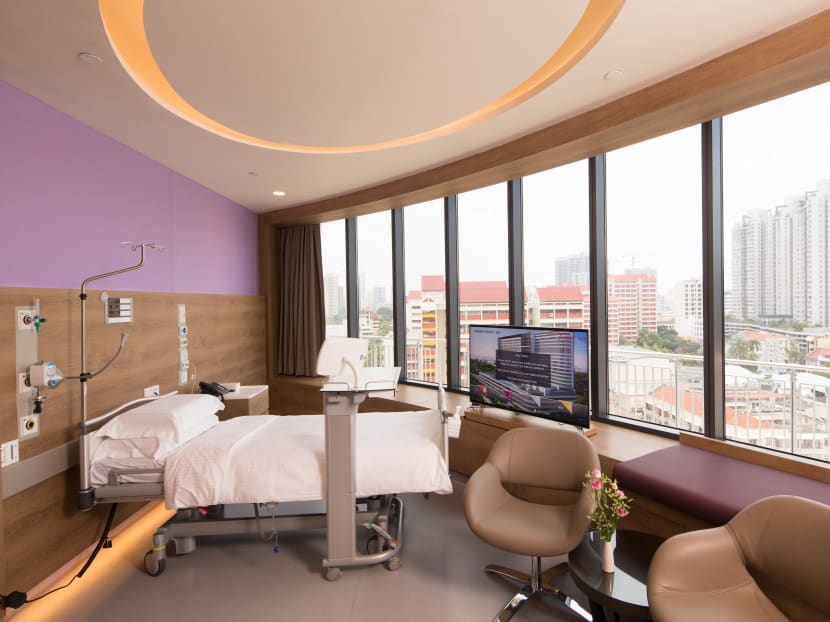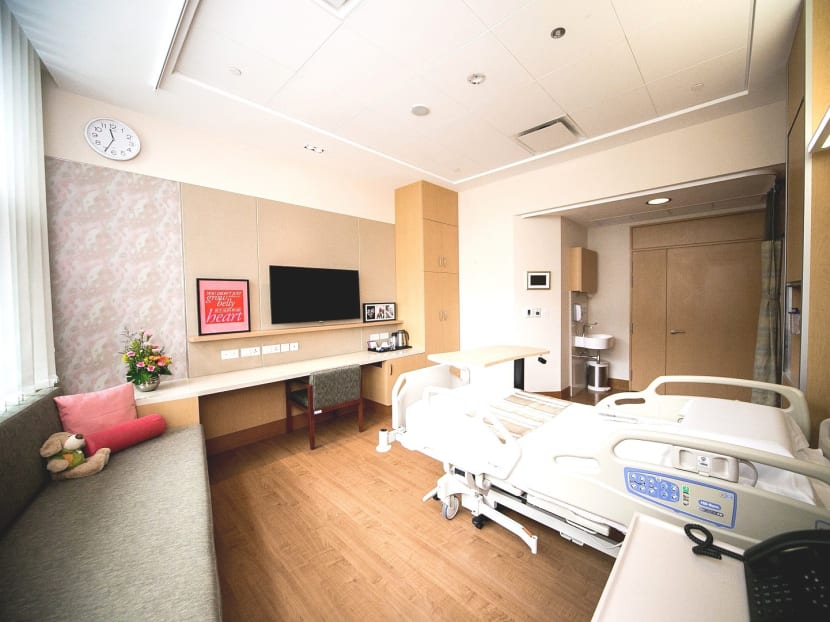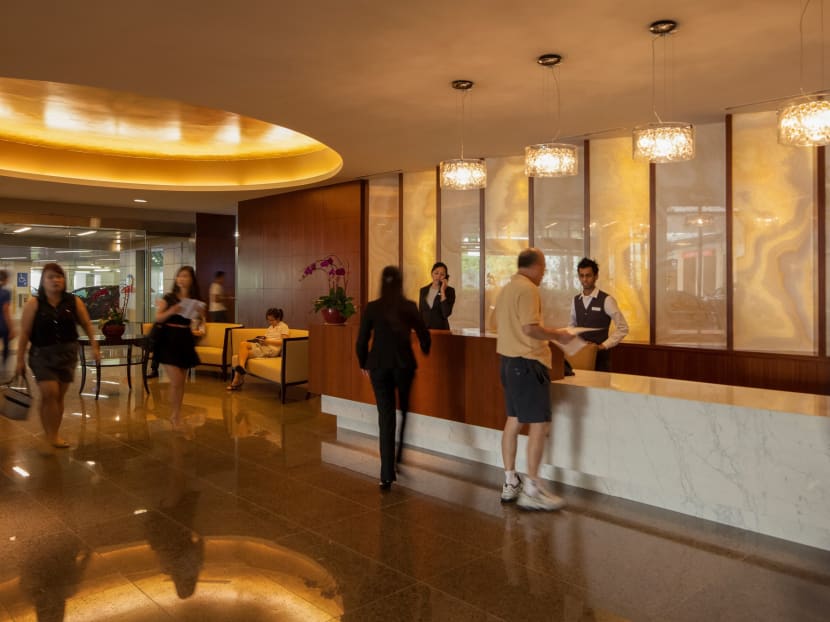The rise of 5-star hospitals in Singapore
SINGAPORE — A concierge service, beautifully-plated meals, a personalised tablet with Wi-Fi access and ensuite bathroom complete with premium toiletries were some perks 47-year-old business owner Ms Wong Li Ping enjoyed during her five-night hospital “staycation” at Farrer Park Hospital (FPH) last December.



SINGAPORE — A concierge service, beautifully-plated meals, a personalised tablet with Wi-Fi access and ensuite bathroom complete with premium toiletries were some perks 47-year-old business owner Ms Wong Li Ping enjoyed during her five-night hospital “staycation” at Farrer Park Hospital (FPH) last December.
“The staff even went the extra mile to provide me with cranberry juice every day although it was not on the menu as a natural adjuvant to my therapy. I felt pampered, as if I was staying in a five-star hotel,” said Ms Wong, who was admitted for a renal condition that required intravenous treatment.
These five-star healthcare hospitality and frills are no longer reserved only for the uber-rich. Private hospitals that look and feel like upscale hotels are growing in numbers here, catering to a mix of local patients and medical tourists.
In 2012, Parkway Pantai Group launched Mount Elizabeth Novena Hospital (MNH) comprising only single-bedded rooms. Each room comes with standard hotel-styled features such as floor-to-ceiling windows, marble bathrooms, mini bar, coffee machines and luxury linen. Also available upon request - at no additional charges - are limousine transfer services and complimentary massages for maternity patients.
Slated to officially open its doors this month, FPH is the newest private hospital in town. The 220-bedded facility is part of Singapore’s first fully integrated healthcare-hospitality complex which links the hospital to a five-star One Farrer Hotel and Spa, restaurants and educational facilities.
Besides its upscale offerings, arrangements can be made for relatives of patients to have direct access into the hospital’s deluxe suites from the hotel, a boon for international patients travelling with family members.
HIGHER EXPECTATIONS AND OVERSEAS RIVALS
Single rooms significantly reduce the risk of hospital-acquired infections while the added privacy allow patients to recover in peaceful environment, said Mr Stephens Lo, chief executive officer of MNH.
There are also higher patient expectations. “Even many of our hawker centres are now air-conditioned. What you would consider frills in the past is now the today’s norm,” said FPH’s spokesperson.
Recognising this, facilities providing maternity healthcare services have also jumped on the bandwagon, wooing patients with complimentary perks at no additional charges. Beyond clinical services, patients now look for value-added offerings, said Ms Mega Shuen, general manager at Thomson Medical Centre.
For instance, TMC provides maternity patients with a complimentary massage service as well as post-discharge phone call services to ensure that mother and baby are coping well. Mothers who deliver there this year will also enjoy a specially commissioned luggage comprising a range of premium maternity and baby items.
Stiff overseas competition is also keeping the private healthcare sector here on their toes.
International patients form about 30 and 50 per cent of total patients seen at MNH and FPH respectively. MNH’s Mr Lo noted that regional competitors are catching up with Singapore on clinical competencies for standard medical procedures, often at a lower cost.
“In order to compete effectively, we have to move up the value chain, place greater focus on developing our capabilities, complex procedures and provide an overall superior patient experience through high service standards. At MNH, we seek to provide our patients with high quality of care at affordable prices,” he said. In 2013, MNH introduced Class A single rooms in 2013, priced at S$418, about 35 per cent less than rates for standard single rooms.
A 2015 BMI Research report has warned that Singapore will lose medical tourists as patients explore cheaper options to competing hubs in neighbouring cities. In 2013, medical expenditure generated from travellers was S$832 million, a decline of 25 per cent from 2012’s S$1.11 billion, according to figures from Singapore Tourism Board.
FPH’s spokesperson said significantly higher pricing premiums are “no longer sustainable for the private hospital sector given the changing economy and overseas competition”.
“Singapore continues to attract international patients who come to us for more complex medical procedures, such as heart surgery, due to our reputation for high quality of clinical care. Even so, we still hope to make high standard of care affordable for our target audience,” she added.
COMPETITIVELY-PRICED
A check revealed competitive inpatient room rates between some restructured and private hospitals here.
For private patients, a Class A single bedded room in National University Hospital’s (NUH) general ward is around S$527 a night, with deluxe rooms in the same ward at around S$762. For private patients, a Class A single bedded room in National University Hospital’s (NUH) general ward is around S$527 a night, with deluxe rooms in the same ward at around S$762. A Class A1 single bedded room at Khoo Teck Puat Hospital and Tan Tock Seng Hospital’s (TTSH) acute ward starts from $420 a night, while a deluxe room at TTSH’s acute ward starts from S$550 a night, according to the hospitals’ websites.
MNH’s Class A room is priced from S$418 per night while its single signature room, which comes with personalised nursing service, starts from S$710 per night. FPH, which offers four-bedded, single bedded and deluxe suites, charges S$562 per night for a single-bedded suite.
But while rooms charges are competitively priced, they are not indicative of overall hospital bill size, which vary with different medical procedures and doctors’ fees. For instance, the estimated 90th percentile bill size for cataract day surgery for private patients is S$9,073 and S$8,867 at FPH and MNH respectively; at NUH and Singapore National Eye Centre, it is S$6,598 and S$5,464 respectively, according to figures by Ministry of Health.
According to Mr Lo, a private integrated shield plan with riders often allows patients to enjoy full coverage during their private hospital stay. Some prenatal insurance plans in the market also offer health and financial protection for expectant mothers and their babies, added Ms Shuen.
For 34-year-old interior designer Ray Chua Chia Howe, a private integrated shield plan with a rider took care of a S$5,600 hospital bill incurred during a serious bout of salmonella poisoning last year. His three-day MNH stay included procedures such as a CT scan done at the Accident and Emergency department, blood and stool tests and injections.
“I knew that my shield plan allows me to be treated at a private hospital and I appreciate the comfort in knowing I don’t have to wait as long, or risked having very limited room options at the restructured hospitals,” he said.









